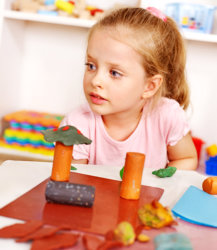
Magical Kids Therapy focuses on the care of children who have autism spectrum disorder (ASD) or who are suspected of having autism spectrum disorder. Magical Kids Therapy provides Occupational and Speech Therapy services for ASD and related conditions, and helps families by assisting them with resources. Magical Kids Therapy is a multidisciplinary effort between Occupational and Speech Therapist working together; experts from these fields conduct extensive evaluations to form a plan of intervention and therapy.
Common signs of autism spectrum disorder include problems with social interactions, problems communicating with others, playing at developmentally inappropriate levels, and a tendency to repeat the same actions over and over. Early diagnosis is important for children with autism so that specific life skills may be taught.
Speech-Language Therapy
Most autism behavioral intense therapy programs include speech-language therapy. With a variety of techniques, speech-language therapy addresses a range of challenges often faced by persons with autism. For instance, some individuals on autism spectrum do not speak, while others love to talk but have difficulty using conversational speech and/or understanding the nuances of language and nonverbal cues when talking with others.
Speech-Language therapy is designed to coordinate the mechanics of speech with the meaning and social use of language. Such a program begins with an individual evaluation by a speech-language pathologist to assess an individual’s verbal aptitudes and challenges. From this evaluation, the pathologist sets goals that may include mastering spoken language and / or learning nonverbal communication skills such as sign or gestures. In each case, the goal is to help the person communicate in a more useful and functional way.
Occupational Therapy
Occupational Therapy (OT) addresses a combination of cognitive, physical, and motor skills. Its goal is for the child or adult to gain age-appropriate independence and participate more fully in life. For a person with autism, occupational therapy often focuses on skills for appropriate play or leisure skills, learning, and self-care skills.
Therapy begins with a certified occupational therapist evaluating the person’s developmental level as well as related learning styles, social abilities, and environmental needs. Based on this evaluation, the therapist determines goals and selects strategies and tactics for enhancing key skills. For instance, goals may include independent dressing, feeding, grooming and use of toilet, along with improved social, fine motor, and visual perceptual skills. Typically, occupational therapy consists of half-hour to one-hour sessions with an established frequency.



